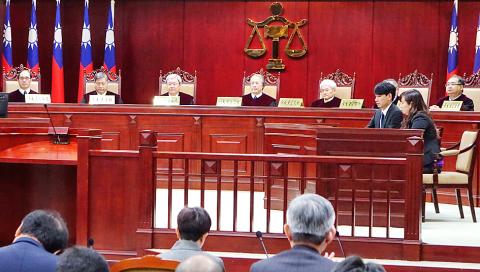In an unprecedented move, the Council of Grand Justices yesterday announced that it would broadcast live a debate next month on the issue of same-sex marriage from the perspective of a constitutional interpretation.
Legal professionals and four academics are to participate in the debate, which is scheduled for 9:30am on March 24, it said.
The debate will address two requests for a constitutional interpretation on the issue of same-sex marriage, the council said, adding that the cases were filed by the Taipei City Government and gay rights advocate Chi Chia-wei (祁家威).

Photo: Liu Hsin-de, Taipei Times
Chi is widely known as one of the nation’s pioneers in the fight for marriage equality, having first sought recognition of his union with his partner 16 years ago through a constitutional review of the nation’s marriage laws, in which he was defeated.
Three years ago, Chi initiated a second attempt, which also met with failure, despite having the support of the Taiwan Alliance to Promote Civil Partnership Rights and more than a dozen lawyers. That case was defeated in the Supreme Court in August 2015.
The March 24 debate would be Chi’s third request for a constitutional review of the nation’s marriage laws.
The other constitutional interpretation requested was filed by the Taipei City Government’s Bureau of Civil Affairs, which has been receiving an increasing number of same-sex marriage registration requests since Chi’s second appeal.
Taiwan Tongzhi Hotline Association research associate Lu Hsin-chieh (呂欣潔) and her partner, in addition to two other same-sex couples, filed an administrative lawsuit against the bureau after their marriage applications were rejected.
The bureau in 2015 filed for a constitutional interpretation in response.

DAREDEVIL: Honnold said it had always been a dream of his to climb Taipei 101, while a Netflix producer said the skyscraper was ‘a real icon of this country’ US climber Alex Honnold yesterday took on Taiwan’s tallest building, becoming the first person to scale Taipei 101 without a rope, harness or safety net. Hundreds of spectators gathered at the base of the 101-story skyscraper to watch Honnold, 40, embark on his daredevil feat, which was also broadcast live on Netflix. Dressed in a red T-shirt and yellow custom-made climbing shoes, Honnold swiftly moved up the southeast face of the glass and steel building. At one point, he stepped onto a platform midway up to wave down at fans and onlookers who were taking photos. People watching from inside

A Vietnamese migrant worker yesterday won NT$12 million (US$379,627) on a Lunar New Year scratch card in Kaohsiung as part of Taiwan Lottery Co’s (台灣彩券) “NT$12 Million Grand Fortune” (1200萬大吉利) game. The man was the first top-prize winner of the new game launched on Jan. 6 to mark the Lunar New Year. Three Vietnamese migrant workers visited a Taiwan Lottery shop on Xinyue Street in Kaohsiung’s Gangshan District (崗山), a store representative said. The player bought multiple tickets and, after winning nothing, held the final lottery ticket in one hand and rubbed the store’s statue of the Maitreya Buddha’s belly with the other,

‘NATO-PLUS’: ‘Our strategic partners in the Indo-Pacific are facing increasing aggression by the Chinese Communist Party,’ US Representative Rob Wittman said The US House of Representatives on Monday released its version of the Consolidated Appropriations Act, which includes US$1.15 billion to support security cooperation with Taiwan. The omnibus act, covering US$1.2 trillion of spending, allocates US$1 billion for the Taiwan Security Cooperation Initiative, as well as US$150 million for the replacement of defense articles and reimbursement of defense services provided to Taiwan. The fund allocations were based on the US National Defense Authorization Act for fiscal 2026 that was passed by the US Congress last month and authorized up to US$1 billion to the US Defense Security Cooperation Agency in support of the

‘COMMITTED TO DETERRENCE’: Washington would stand by its allies, but it can only help as much as countries help themselves, Raymond Greene said The US is committed to deterrence in the first island chain, but it should not bear the burden alone, as “freedom is not free,” American Institute in Taiwan Director Raymond Greene said in a speech at the Institute for National Defense and Security Research’s “Strengthening Resilience: Defense as the Engine of Development” seminar in Taipei yesterday. In the speech, titled “Investing Together and a Secure and Prosperous Future,” Greene highlighted the contributions of US President Donald Trump’s administration to Taiwan’s defense efforts, including the establishment of supply chains for drones and autonomous systems, offers of security assistance and the expansion of